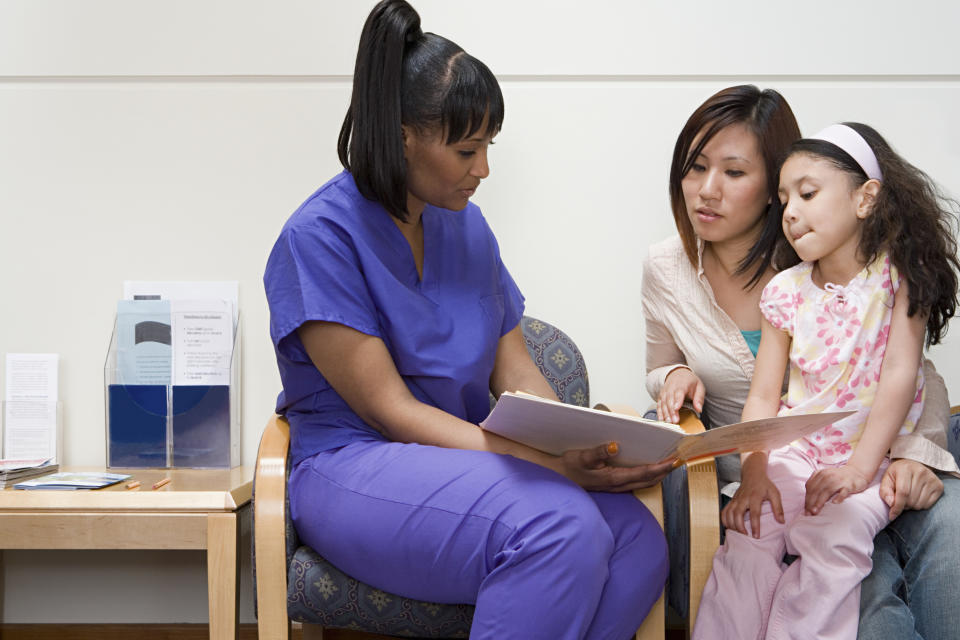Pediatricians Are Sharing Their Honest Thoughts On Everything From "IPad Babies" To Processed Food
Staying on top of your own health is a task in itself, but when you have children and want to make sure their health is in order — trips to the pediatrician are crucial.

Technically, there isn't an age limit for people pediatricians can treat. Pediatricians are trained to treat patients through the different stages of life, from infancy through young adulthood, around 21 years old — a crucial time when bodies and minds are still developing. There's no set age for people to switch from a pediatrician to an adult doctor, and it's up to when a patient is ready to make that decision.
Whether you're a new parent or just want to learn how to stay on top of your child's health, there are many things you probably don’t realize you're doing too much or not enough when it comes to your children. I spoke to a few experts — including board-certified general pediatricians and pediatric neurologists — to learn more about things every parent should know regarding their child's health. Here's what they had to say.

1.Parents trying to be overly prepared for how to raise their children can actually cause more harm than good.

"I see patients from newborn stage up to 21-year-olds in my office for wellness checks and sick visits. After so many years experiencing hundreds and hundreds of patients and family encounters, I have come to recognize a widespread prevalence of anxiety, fear, and overwhelm," said board-certified pediatrician Yami Cazorla-Lancaster, DO, MPH, MS, FAAP.
"We have more information than ever on how to raise our children, but in many ways, that has made us more fearful of all the things that could go wrong. Parents are so stressed that they aren't parenting right, and the fear and anxiety about doing it 'right’ causes parents to attempt to control every situation," Cazorla-Lancaster added.
"This leads to perfectionism, an all-or-nothing approach, and helicopter parenting, and affects many aspects of a child's life, including feeding, education, and sports," she said.
2.Experts warn parents to stop trying to be a "perfect parent."

"I am also seeing anxiety present in younger and younger ages because children are living much different lives now than we did decades ago. As a parent myself, I have experienced all of this. What I wish for all of us is that we take a step back and gain some perspective. Let's stop trying to be perfect and inject more lightheartedness and fun into parenting. Your kids really are going to be okay! Unfortunately, we can't control everything, but we can make the parenting journey more enjoyable for ourselves and the whole family," Cazorla-Lancaster said.
3.Raising "iPad kids" is okay if boundaries are set.

"Avoid overusing screens, as too much of it can lead to nearsightedness. I believe in a balanced approach to screen time so it's important to prioritize exercise and social interaction with loved ones in the home if screens are also being used. Setting rules like no screens during meals or before bed is also useful," said Mona Amin, board-certified general pediatrician, IBCLC, parenting coach, and expert for TYLENOL®.
4.It's important to pay attention to what your kids are eating, but even things that you might think are unhealthy are okay in moderation.

"I think balance is key here. We should monitor processed foods, added sugar, and food dyes. It doesn't mean we can't have these things on rotation, but a child's diet shouldn't be all-encompassing of these foods," Amin said.
"I respect that every home has different financial means and resources, but it’s important that a family monitors their intake of processed foods, sugars, and dyes and leans in on fresh foods like fruits, veggies, and lean meats when possible," Amin added.
"Being healthy isn't a checklist, but a lifestyle that begins early on. And maybe you will go through difficult or easy seasons where you’re in survival mode. During survival mode, such as a stressful or busy work week, you may lean on more processed foods or screen time. This is okay," Amin said.
5.If parents reprimand a child because they don't understand why their child is acting out, this may cause the child to act out even more.

"So, for example, a parent might bring in a child that is consistently throwing tantrums, banging their head or engaging in self-harm activities, flapping their hands, or not making eye contact, and unfortunately sometimes parents, from a place of not understanding what is happening with their child, may try to discipline them or use other techniques to modify the behaviors that are not beneficial," said Sharief Taraman, MD, DABPN, DABPM, FAAP, and CEO of Cognoa.
"These traits and behaviors could point towards a behavioral or developmental condition — like autism. Without understanding why the child is behaving the way they are, they may cause the child to act out more," Taraman added.
6.Observing children without imposing narratives is key for doctors to learn about them.

"As a pediatric neurologist, observation is the most important aspect of our neurologic exam. By observing children, we gain huge insights, such as the quality of the child's interactions. How is their speech? What are their motor abilities, and do they exhibit any sensory issues?" Taraman said.
7.It's important not to ignore or deny signs that your child may have a developmental delay.

"This is sometimes driven by fear or societal stigma, but denial creates a delay in treatment, which ultimately sets the child back. As pediatric neurologists, our mantra is 'early is everything.' I always encourage parents to ask questions, act on their concerns as soon as they arise, and trust their instincts," Taraman said.
"If their child is displaying traits or behaviors that concern them or seems to be developing slower than their peers, parents should speak to their pediatrician and request an evaluation right away. And if one parent chooses to ignore these signs or doesn't want to address them, remind them that information is power. It's better to get an assessment and know (rather than guess) how to support your child best," Taraman added.
8.If you have any concerns about your child and you get advice to "wait and see," get a second opinion.

"This practice delays accessing highly beneficial and critical early interventions. Evidence shows that parental concern is THE best indicator of a later neurodevelopmental diagnosis. Parents know their children best, so when they have concerns, they're often right. Therefore, I strongly encourage any parent met with a 'wait and see' response to advocate for their child and pursue a developmental evaluation," Taraman said.
"Don't be afraid to push for answers — you'll either discover that you're wrong or kick-start the journey to getting your child the care they need. It's a win-win situation either way. There are also specialized public and private intervention programs, parental support organizations, and educational resources that are available to parents with concerns. Ask your doctor about them or do your own research," Taraman advised.
9.Waiting too long to address concerns about your child's health or behavior can sometimes snowball into other issues.

"In my own clinical practice, I once assessed and diagnosed a young boy with autism after he was hospitalized for scurvy. His sensory aversions made him seem like a picky eater and led to a severe Vitamin C deficiency. Because his condition wasn't identified and addressed sooner, his health was significantly impacted," Taraman explained.
Staying on top of your children's health and well-being is important. Always consult with your doctor first if you have any questions or concerns.

